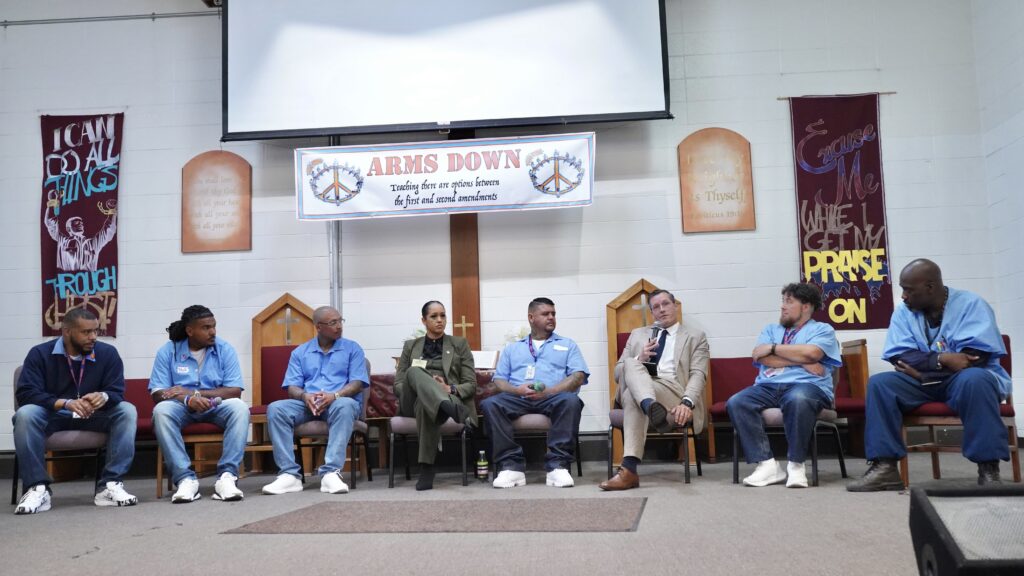
Arms Down, a mutual-help group addressing firearm addiction, recognized its latest cohort of graduates in an uncommon violence intervention-type ceremony at San Quentin Rehabilitation Center in August.
Speakers on a panel discussed the seriousness of gun violence, instead of a predictable stroll to the stage Pomp & Circumstance. The institution’s Chapel B held a blend of family, friends, outside guests, staff, and public safety officials who listened to strategies on how to dismantle beliefs that would lead someone to use a firearm to harm someone or even take a life.
“There’s always options, but due to our beliefs, we don’t use them,” said Jessie Milo, co-creator of Arms Down and host of the event. “The irony is that carrying a gun makes us less safe.”
The program addressed the problem of America’s firearm addiction and the subsequent violence when one uses a gun. Some of the best persons to offer solutions are those with lived experiences—those convicted of firearm offenses. They came together to discuss community solutions to end gun violence.
Greg Fidell, a gun violence prevention advocate and senior manager at the Brady Center, said a billion-dollar gun industry profits from gun violence. He told the audience that California spends roughly $130,000 to incarcerate one person for one year. He said it cost some $13 million a year to house the approximately 100 participants in this event, but their incarceration did not make him feel safer.
“This [Arms Down] class makes me feel safe,” said Fidell. “You are all making California safer. Let’s address the root cause of gun violence in this country.”
Milo said, “At night, in many of our cities, we can hear gunshots like heartbeats. But it’s not hearts beating. It’s hearts stopping; the hearts of brothers and sisters across our nation.” He proffered, “Through my experience over the last decade doing trauma work, I’ve identified a correlation between experiencing firearm-related trauma and becoming a gun offender.”
As a prosecutor, Brooke Jenkins, San Francisco’s district attorney said, “I’m probably the least likely person to be here.” But she has supported the program from its inception. This was not her first Arms Down gathering.
San Quentin’s Warden Chance Andes attended the event, as did several Board of Parole Hearings commissioners, and Public Safety Secretary Michael Redding from the Office of the Governor.
Arms Down is the brainchild of Jemain Hunter. He conceived the idea after feeling indifferent toward other self-help groups that failed to address the root cause of gun violence. “It’s about public safety,” he said.
After the panel took the stage to discuss public safety, solutions to gun violence, toxic masculinity, and advice for youth in America, the panelists addressed the question, “What is the biggest lie about guns?”
Arms Downs co-creator Carlos Valdez said the lie he learned about a gun had told him, “It’s for protection.” After two decades of incarceration, he has a different view. “It’s your choice and you don’t have to take revenge.”
Others on the panel echoed similar sentiments about carrying a firearm.
“We think we’re alone when we use a gun,” said George Coles-El, another Arms Down co-creator. “It’s all about choices. But a choice I don’t know is a choice I don’t have.”
Arms Down secretary and co-creator Christopher Christensen said he used to believe the big lie that told him that “If you pull it, you have to use it.”
After listening people on the panel give their reasons to carry firearms, Redding said, “We can invest in violence intervention. Society and government should not place people in a position where they feel a gun is needed.”
District Attorney Jenkins has visited San Quentin at least a dozen times in recent years. Asked about what her office has done to prevent gun violence, she responded, “My office wasn’t doing anything but prosecuting.” She added that her office has since begun to employ intervention, underscoring that her role as a public safety official gives her a duty to prevent crime before it occurs — instead of prosecution after the fact.
“I’m highly supportive of making sure [Arms Down] gets replicated outside,” said Jenkins. She suggested that enrolling some firearm offenders in an Arms Down course on the outside might make an effective condition of probation. To the possible offenders, she said, “You can be seen, and you can be heard without it being on the inside of a courtroom.”
Lunch and awarding certificates to the graduates amounted to more of an afterthought as everyone agreed that much work still lay ahead to provide feasible solutions to gun violence.